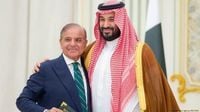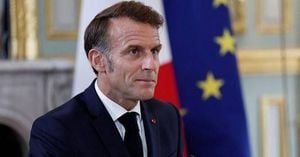In a move that has sent ripples across the Middle East and South Asia, Pakistan and Saudi Arabia have signed a landmark strategic mutual defence agreement (SMDA), formalizing a new chapter in their decades-old alliance. The signing ceremony, held on September 17, 2025, at the opulent Royal Court in Al-Yamamah Palace, Riyadh, saw Pakistani Prime Minister Shehbaz Sharif welcomed with full royal protocol by Saudi Crown Prince Mohammed bin Salman. The event was marked by the thunderous flyover of Saudi F-15 fighter jets and a red carpet, signaling the gravity of the occasion and the deepening of ties between the two nations.
The agreement, which observers describe as a watershed moment, comes at a time of heightened regional tension. According to Al Jazeera, the pact states that any aggression against either Saudi Arabia or Pakistan will be considered an aggression against both, effectively binding the two countries in a collective security arrangement. "The agreement states that any aggression against either country shall be considered an aggression against both," Pakistan's Ministry of Foreign Affairs confirmed, emphasizing the shared commitment to strengthen security and promote regional peace.
This bold step follows a tumultuous period in the region. In the months leading up to the agreement, Israel launched a 12-day war with Iran, targeting nuclear facilities and senior leaders, and then, on September 9, 2025, carried out a deadly attack on Doha, Qatar, killing at least five Hamas members and a Qatari security official. These actions have left Gulf states increasingly wary about relying solely on the United States for their security, especially as Washington remains Israel’s closest ally. The attack on Qatar, which borders Saudi Arabia, triggered an emergency meeting of Arab and Islamic nations and prompted Gulf Cooperation Council (GCC) states to announce the activation of a joint defence mechanism.
It is against this backdrop that the Pakistan-Saudi pact was signed. As DW News reports, the agreement aims to develop aspects of defense cooperation between the two countries and to strengthen joint deterrence against any aggression. The timing is no coincidence, coming just months after a four-day military conflict in May 2025 between Pakistan and India—both nuclear-armed—resulted in approximately 70 military and civilian deaths. The escalation, the worst since 1999, saw missile, drone, and artillery fire exchanged between the two rivals, with Saudi Arabia reportedly playing a role in deescalating the situation.
For both Riyadh and Islamabad, the agreement is a significant evolution of their relationship. The two countries’ ties stretch back nearly eight decades, beginning with Saudi Arabia being one of the first states to recognize Pakistan after its independence in 1947. In 1951, they inked a Treaty of Friendship, laying the foundation for years of strategic, political, military, and economic cooperation. Since 1967, Pakistan has trained more than 8,000 Saudi military personnel, and a 1982 accord formalized the deputation of Pakistani Armed Forces and military training in the kingdom.
But this latest pact is more than a continuation of old traditions. Muhammad Faisal, a South Asia security researcher at the University of Technology Sydney, told Al Jazeera that the agreement will consolidate and formalize multi-prong defence cooperation already underway, opening new avenues for joint trainings, defence production, and even the potential expansion of Pakistani troop contingents in Saudi Arabia. Faisal suggested the deal could serve as a template for future bilateral defence cooperation with other Gulf partners such as the United Arab Emirates and Qatar.
Yet, the agreement is not without its complications. The United States, long the region’s security guarantor, was reportedly not informed about the pact until after it was signed, according to GZERO. This omission is notable, given that the U.S. currently has between 40,000 and 50,000 troops stationed across the Middle East, including major bases in Saudi Arabia. During President Joe Biden’s administration, the U.S. imposed sanctions on Pakistani individuals and firms over alleged ballistic missile development and raised concerns about the range and capability of Pakistan’s missiles. Sahar Khan, an independent security analyst in Washington, DC, told Al Jazeera that "Pakistan already has a credibility problem in Washington, and this agreement won’t reduce it." She added that it is in Pakistan’s interest to clarify that its nuclear and missile programs are India-centric, and that Islamabad will not fight Saudi wars but will provide relevant support.
The nuclear question looms large over the pact. Pakistan is the only Muslim-majority country with nuclear weapons and boasts the largest army in the Islamic world. Saudi Arabia, meanwhile, has expressed interest in civilian nuclear technology to diversify its energy sector but has consistently denied seeking nuclear weapons. In his 2024 book War, American journalist Bob Woodward recounted a conversation in which Crown Prince Mohammed reportedly told U.S. Senator Lindsey Graham that if he ever needed a bomb, "I will just buy one from Pakistan." However, Khan was quick to note that there is nothing in the current agreement indicating the formation of a nuclear umbrella or any extended deterrence. "It is important to note that while Pakistan has made defence pacts before, none of those have led to nuclear assurances or a formation of a ‘nuclear umbrella’. There is nothing in this agreement that indicates a formation of a nuclear umbrella or any extended deterrence," she explained.
India, Pakistan’s perennial rival, is watching developments closely. Relations between the two countries have sunk to historic lows, especially after a deadly attack in Indian-administered Kashmir in April 2025 and the subsequent military skirmish. Indian foreign ministry spokesperson Randhir Jaiswal stated, "We will study the implications of this development for our national security as well as for regional and global stability. The government remains committed to protecting India’s national interests and ensuring comprehensive national security in all domains." With Saudi Arabia being India's third-largest oil supplier and home to more than 2.5 million Pakistani expatriates, the kingdom now finds itself balancing complex relationships with both South Asian powers.
For Pakistan, the agreement represents a significant diplomatic and strategic win at a time when its economy is faltering and increasingly dependent on Saudi financial support. As Faisal observed, "Pakistan’s relative position has improved, and new space has opened for expanding the Pak-Saudi cooperation on both bilateral defence and regional security matters." Asfandyar Mir of the Stimson Center highlighted the risks, noting that "Pakistan now risks entanglement in Saudi Arabia’s regional rivalries, particularly with its neighbour Iran," while Saudi Arabia has committed itself to Pakistan’s disputes, notably with India and potentially with Taliban-led Afghanistan.
Despite the uncertainties and potential challenges, few doubt the political significance of the SMDA. As Mir put it, "It’s a huge development for both countries." While the pact may be more a political statement than a binding military alliance for now, it signals a deepening of defence coordination and a rebalancing of relationships in a region where security guarantees are increasingly in flux. Whether this agreement will lead to greater stability or new entanglements remains to be seen, but it undeniably marks a turning point in the strategic landscape of the Middle East and South Asia.




